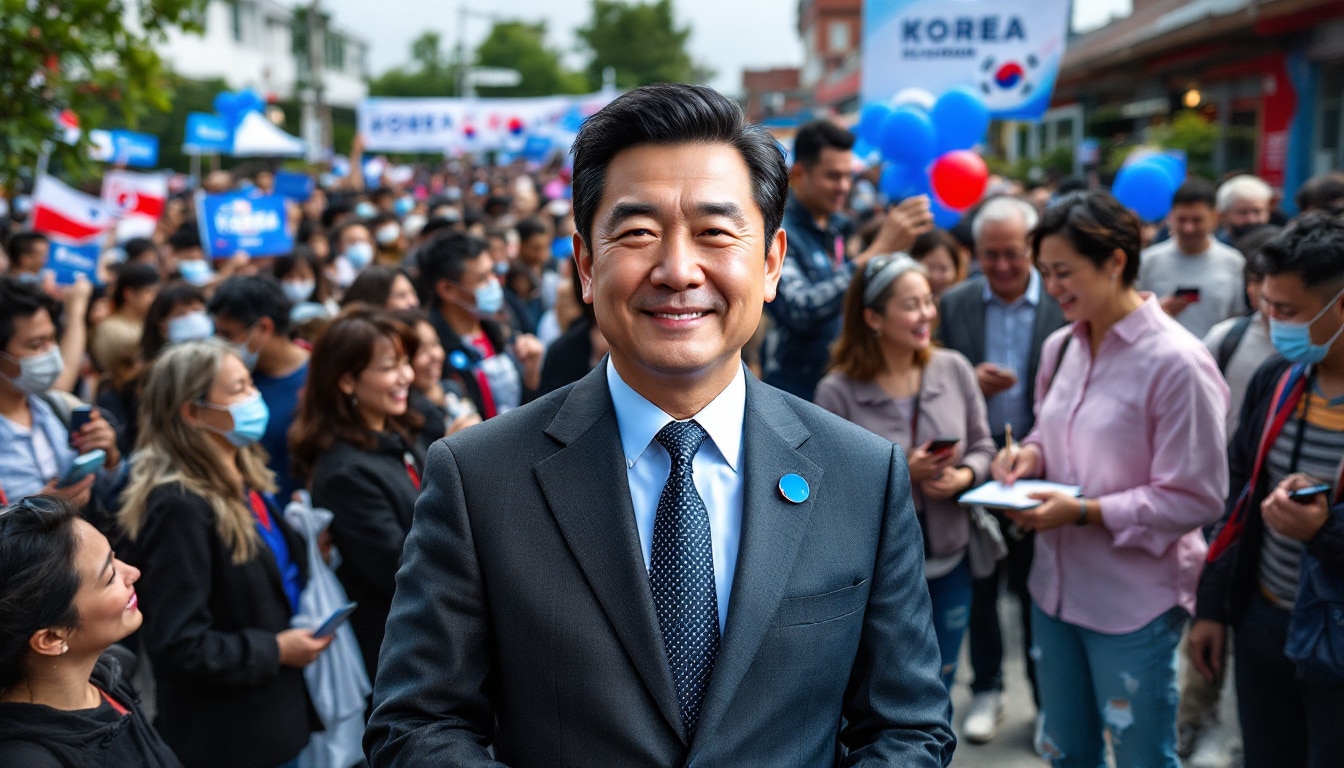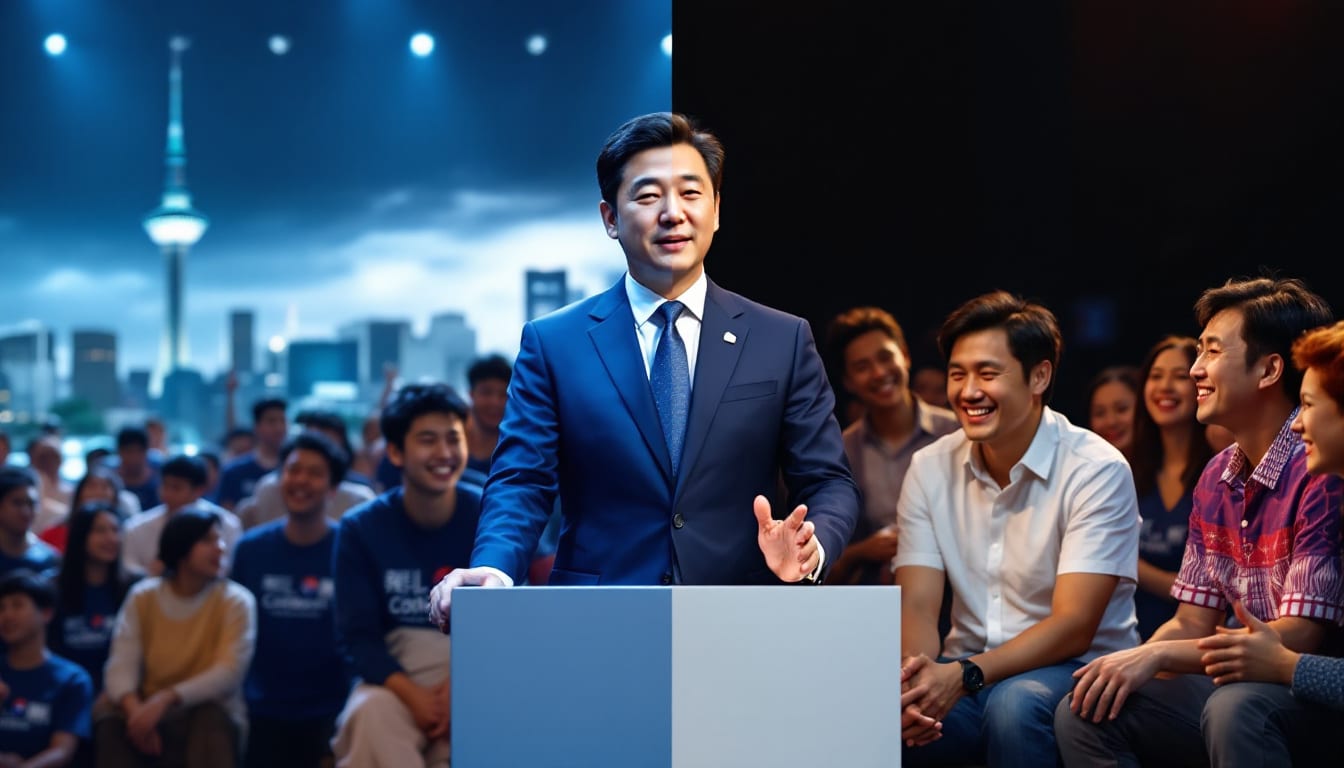We use cookies and data to provide and maintain our services.
These tools allow us to monitor performance and protect against abuse such as spam and fraud.
They also help us measure audience engagement and understand the use of our services.
Thanks to this information, we can improve the quality of our services and develop new features tailored to your needs.
By accepting all cookies, you allow us to deliver and measure the effectiveness of personalized advertisements according to your preferences.
Choosing to reject all cookies limits their use to essential features, influencing only the content and non-personalized advertisements.
For an optimized experience tailored to your profile, we adjust our content based on your previous searches and your general location.

In the South Korean political landscape, presidential candidates are increasingly adopting the MBTI to define their leadership styles. This approach determines whether a potential leader is more of a commander or a caregiver. Commander type leaders stand out for their determination, their ability to make quick decisions, and their results-oriented approach. They are often seen as strong figures, capable of guiding the country with confidence and strategy.
In contrast, caregiver type leaders emphasize empathy, collaboration, and the overall well-being of the population. They prefer an inclusive approach, where every voice is heard and where social development is at the heart of their concerns. This type of leadership fosters a climate of trust and support, essential for a harmonious society.
The use of MBTI thus offers voters a better understanding of the different leadership approaches proposed by the candidates. It allows everyone to choose a leader whose style best aligns with their own values and the current needs of the nation. Ultimately, this method contributes to a more transparent democracy and governance that is more responsible and aligned with the aspirations of the people.

The South Korean political landscape is undergoing significant evolution with the adoption of MBTI (Myers-Briggs Type Indicator) by presidential candidates. This trend reflects an increased quest for understanding leadership styles and the personalities of potential leaders. By integrating psychometric tools like the MBTI, candidates aim to better define their approaches to governance and communicate effectively with the electorate. This strategic choice also allows voters to better grasp the differences between candidates, thus facilitating a more informed decision-making process during elections. The use of the MBTI goes beyond a mere personality label; it fits within a holistic approach aimed at aligning leaders’ personal skills with the needs of the country. This context highlights the growing importance of personal development tools in the political arena and raises the question of their real impact on the quality of leadership exercised.
The Importance of MBTI in Leadership Assessment
The MBTI has become an essential tool for assessing the leadership capabilities of candidates. By identifying personality preferences, the MBTI helps understand how a leader might react to challenges and interact with their teams. For example, an ENTJ type candidate is often perceived as a commander, capable of making quick decisions and leading with confidence. In contrast, an ESFJ type might be seen as a caregiver, favoring collaboration and collective well-being. This distinction not only helps voters connect with candidates whose style best matches their expectations, but it also encourages leaders to adopt suitable communication strategies. Furthermore, the use of the MBTI fosters better dynamics within political teams by recognizing and valuing personality diversity. Thus, the MBTI contributes to creating a more harmonious and productive work environment, essential for the success of electoral campaigns and future governance.
The Leadership Style of the Commander
Commander type leaders, often associated with the ENTJ type of the MBTI, are characterized by their clear vision and ability to make bold decisions. These leaders are action-oriented and have a strong aptitude for organizing and managing teams effectively. For example, an ENTJ candidate might propose ambitious economic reforms or lead innovative technological initiatives to stimulate national growth. Their direct approach and self-confidence often inspire respect and admiration, which can be a significant asset during electoral campaigns. However, this leadership style can sometimes be perceived as authoritarian or insensitive, requiring a balance between firmness and empathy. To illustrate, an article on leadership toward the future highlights how commanders can integrate advanced technologies to enhance their effectiveness. Ultimately, the leadership of the commander is often synonymous with dynamism and innovation, qualities essential for navigating an ever-evolving world.
The Leadership Style of the Caregiver
In contrast to commanders, caregiver type leaders, often associated with the ESFJ type of the MBTI, emphasize collective well-being and cooperation. These leaders prioritize open communication and active listening, thereby creating an inclusive and harmonious environment. For example, an ESFJ candidate might focus on social policies aimed at improving citizens’ quality of life or strengthening community support networks. Their ability to empathize with voters and understand their needs contributes to building a lasting trust relationship. However, this leadership style may sometimes lack the authority necessary to implement radical changes, requiring a complementarity with other leadership styles. A charismatic leader hopes to find the right balance between empathy and effectiveness. In summary, the leadership of the caregiver is crucial for establishing humane and responsible governance, essential for social development and national cohesion.
The Use of MBTI by Presidential Candidates
Presidential candidates in South Korea are increasingly adopting the MBTI to clarify and communicate their leadership style. This approach not only distinguishes their personal approach to governance but also addresses the specific expectations of voters. By presenting their MBTI type, candidates offer increased transparency about their working methods and political priorities. For example, an ENTJ type candidate might highlight their strategic ability and long-term vision, while an ESFJ might emphasize their commitment to social programs and the well-being of citizens. This use of the MBTI also facilitates the positioning of candidates on the political spectrum, helping voters identify which candidate’s style aligns best with their own values and aspirations. Moreover, the MBTI becomes a crucial differentiation tool in a political landscape often marked by similar rhetoric. Ultimately, the integration of the MBTI into presidential campaigns represents a major innovation in how leaders present themselves and connect with their audience.
The Impact on Public Perception
The adoption of the MBTI by presidential candidates significantly influences public perception. By disclosing their personality type, potential leaders provide voters with a window into their thought processes and behaviors, thereby enhancing transparency and trust. For example, a candidate identified as a commander may be perceived as determined and resolute, attracting voters seeking stability and strong leadership. Similarly, a caregiver may win the favor of voters sensitive to social issues and community well-being. This transparency regarding leadership style also helps to reduce uncertainties and misunderstandings, facilitating a more authentic connection between candidates and the public. Studies show that voters are more inclined to support leaders whose styles align with their own preferences and values. Furthermore, the MBTI also serves as a basis for more informed public debates, where leadership differences are discussed constructively. In summary, the use of the MBTI enhances the quality of democratic dialogue by providing clear insights into candidates’ skills and intentions.
Concrete Examples of South Korean Candidates and Their MBTI
Several South Korean presidential candidates have revealed their MBTI type, thereby illustrating the diversity of leadership styles within the political competition. For example, one of the leading candidates describes himself as an ENTJ, highlighting his capacity to lead complex teams and implement effective structural reforms. Another candidate, of type ESFJ, emphasizes his dedication to social programs and his willingness to create an inclusive and supportive political environment. These disclosures allow voters to better understand each candidate’s strengths and weaknesses. Moreover, some campaigns use the MBTI to create targeted and personalized messages, thus enhancing voter engagement. For example, a transformational leadership based on the MBTI may be highlighted to underscore a candidate’s commitment to innovation and change. These concrete examples show how the MBTI becomes a strategic tool in political communication, facilitating a better mutual understanding between candidates and their supporters.
The Advantages and Limitations of Using MBTI in Politics
The use of MBTI in politics presents both advantages and limitations. On one hand, it offers a structured method for assessing and communicating leadership styles, thereby facilitating a better fit between candidates and voters’ expectations. Advantages include greater transparency, improved understanding of individual skills, and more targeted communication. For example, a charismatic leader may use their MBTI type to enhance their public presence and influence. On the other hand, the MBTI is not infallible and can sometimes oversimplify the complexity of human personality. Some critics argue that reducing an individual to a personality type can overlook other factors influencing leadership, such as experience, technical skills, and contextual circumstances. Additionally, the rigidity of MBTI categories may limit the perception of candidates’ flexibility and adaptability. Despite these limitations, the MBTI remains a valuable tool when used complementarily with other leadership assessment methods. Ultimately, the balance between advantages and limitations will determine the effectiveness of using the MBTI in political campaigns.
The Impact on Leadership Effectiveness
The adoption of MBTI has a notable impact on the effectiveness of leadership among presidential candidates. By understanding their own personality type, leaders can better leverage their strengths and work on their weaknesses, thus improving their overall performance. For example, an ENTJ commander may learn to moderate their directive approach to foster better collaboration, while an ESFJ caregiver may develop strategic decision-making skills. This self-reflection facilitated by the MBTI leads to more balanced and adaptive leadership, capable of responding to the complex challenges of modern governance. Furthermore, understanding personality types within campaign teams allows for the creation of more harmonious and productive work dynamics. Moreover, effective leadership based on the MBTI can strengthen organizational resilience and capacity for innovation. For instance, a leadership in the era of the future often relies on a deep understanding of different personalities and the ability to mobilize them coherently toward common goals. Thus, integrating the MBTI into leadership contributes to more effective and responsive governance.
The Future Implications of Using MBTI in Politics
The future of using MBTI in politics looks promising, with profound implications for governance and leader development. As applied psychology tools become more sophisticated, political leaders can expect increased use of the MBTI to refine their communication and management strategies. This trend could also encourage greater diversity in leadership styles, each bringing a unique and complementary perspective to the decision-making process. Additionally, integrating the MBTI could lead to more targeted training for leaders, focusing on developing relational skills and conflict management. Moreover, the growing use of the MBTI may influence voter expectations, who may begin to value specific personality qualities when evaluating candidates. However, it is crucial to continue assessing the effectiveness and fairness of this tool to avoid any form of stigma or bias. Ultimately, the evolution of using the MBTI in politics will depend on its ability to adapt to the changing needs of society and to contribute positively to the quality of leadership.

“`html
FAQ
Q: What is MBTI and how do South Korean candidates use it to define their leadership styles?
A: The MBTI (Myers-Briggs Type Indicator) is a psychological tool that identifies personality preferences. By using the MBTI, South Korean candidates can better understand and communicate their leadership style, highlighting their strengths and unique ways of managing teams and making decisions.
Q: Why do presidential candidates choose to adopt MBTI for their leadership?
A: Adopting MBTI allows candidates to stand out by showing a thoughtful approach to their personality and management. It also helps voters better understand their leadership style and evaluate their compatibility with the needs of society.
Q: What are the advantages of using MBTI to define a political leadership style?
A: The use of MBTI provides better clarity on candidates’ interpersonal skills and management strategies. It promotes more effective communication, enhances transparency, and allows voters to connect more easily with potential leaders by understanding their personality traits.
Q: How do voters perceive candidates who use MBTI in their leadership approach?
A: Voters appreciate the transparency and authenticity that MBTI brings. By understanding candidates’ personality types, they can better assess their empathy, problem-solving abilities, and compatibility with their own values and expectations.
Q: Are there critiques or limitations to using MBTI in the political realm?
A: Although MBTI is a valuable tool, some critiques point out that it can oversimplify complex personalities and not capture the full diversity of human behavior. Additionally, it should not be used as the sole criterion for assessing a leader’s skills or potential.












